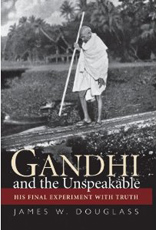"Mohandas Karamchand Gandhi, known as 'Mahatma' ('Great Soul'), was assassinated on January 30, 1948, two and a half years after the first use of weapons that could destroy all of humanity. Gandhi saw nuclear weapons as a confirmation of humanity's need to choose nonviolence for the sake of life itself. 'I did not move a muscle,' he said, 'when I first heard that the atom bomb had wiped out Hiroshima. On the contrary, I said to myself, "Unless now the world adopts nonviolence, it will spell certain suicide for humanity." Nonviolence is the only thing the atom bomb cannot destroy.'
"As Gandhi proclaimed his redemptive vision of a united, non-violent India in the nuclear age, he was murdered by an anti-Muslim, Hindu nationalist group, with the silent complicity of forces in the newborn Indian government. A murderous nationalism, ambition for power, and hatred combined in Gandhi's assassination. India's achievement of independence made Gandhi's murder more feasible. The nation's new leaders had replaced its founding father's nonviolent principles with the foundations of a national security state. In the lengthening shadows of independence, Gandhi was a martyr to the unspeakable."
